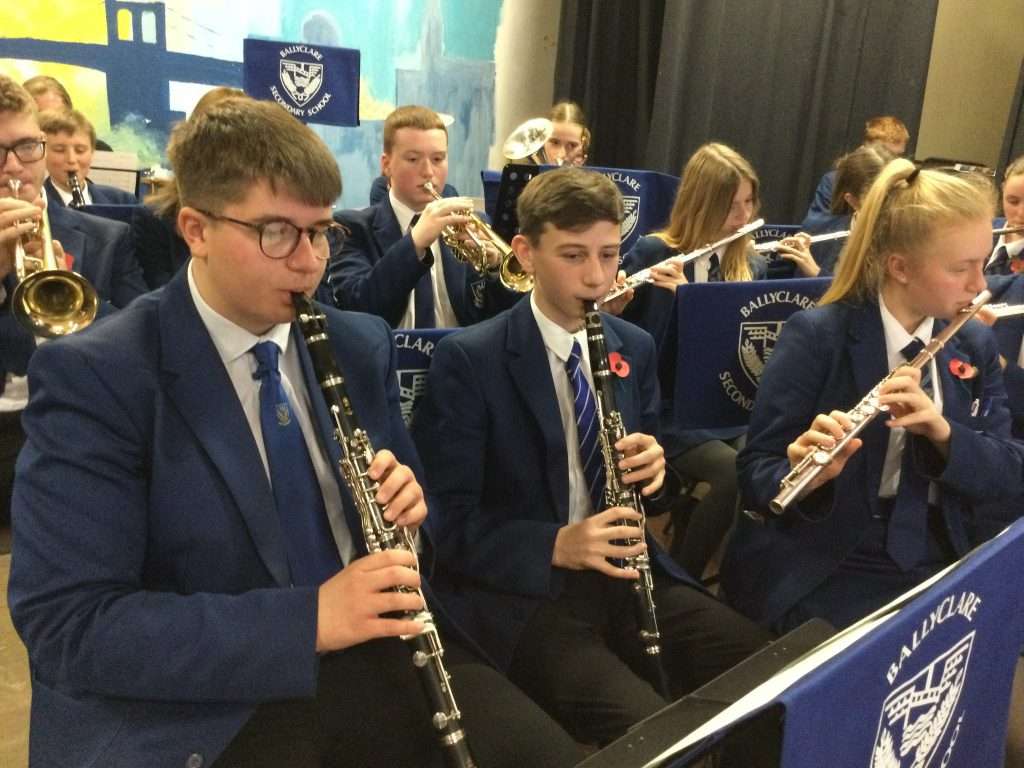Aims and Overview of the Music Department
The department philosophy is based on the belief that every child has an interest in music.
While not every child will want to participate in public performance, it is hoped that the development of sensitivity towards music through personal experience of performing, listening and composing, will provide a basis for appreciation of a wide variety of music in adult life.
The aims of Music education are:
- To develop the necessary skills and concepts to enable musical activity.
- To develop social skills and awareness through making music together.
- To offer pupils opportunities to experience the personal satisfaction and self-confidence derived from striving after the highest possible standards in musical activity.
- To develop an awareness of musical traditions and developments in a variety of cultures and societies.
Enrichment
We have many different opportunities for pupils to develop their musical skills outside the classroom environment including the following extra curricular activities :- Click on links to read more about each activity.
Orchestra - Tuesday 3.00-4.00 pm
Junior Choir - Tuesday during Junior lunch
Senior Choir - Thursday 3.00-4.00 pm
Small Ensembles - Tuesday 3.40-4.00 pm
Theory Club - Friday 3.00-4.00 pm
There are also individual/group lessons available in Voice, Strings, Brass, Piano, Drum Kit , Woodwind, Guitar and Piping and Snare Drumming.
Staffing
Mrs C Stewart (Head of Music)
Miss H Beattie
Mrs E Colgan
Miss A Francis
Peripatetic Staff
Miss M Topley (Voice)
Mrs McKay (Strings)
Miss C Hanna (Woodwind)
Mr C Doherty (Lower Brass)
Mr Riordan (Upper Brass)
Miss L Tosh (Piano)
Mr J Holmes (Drum kit)
Mr McGahey (Guitar)
Mr C Coyle (Bagpipes)
Mr M Shaw (Snare Drumming)
Facilities
The Music Department is privileged to have a Music Suite consisting of 2 classrooms separated by a communal store. Each classroom has 3 practice rooms. There are also two practice rooms located outside the main classrooms which are used for instrumental provision by the peripatetic and private tutors and also for sixth form private study.
The two main classrooms are equipped with keyboards, ukuleles, bass guitars, tuned and untuned percussion instruments, an interactive whiteboard, computer and printer. In addition there are a number of stand alone computers containing music specific software for pupil use and access to a set of ipads for recording and research purposes.
Why Study Music?
"Music is the universal language of mankind." - H.B. Longfellow
Studying Music opens up many opportunities in the field of music and performing arts, both in the world of employment and further study. Music is one of the largest industries in the world and as such provides a variety of job opportunities. Students who have studied A level music with us in Ballyclare Secondary School have gone on to study music at university, some have become teachers, for others it has helped them gain access to their chosen career paths. Many students have continued their interest in music, joining local bands, choirs and music societies.
- Pupils who study music from an early age can do better at a range of subjects.
- Pupils who play music learn there are rewards from hard work, practice and discipline.
- Playing a musical instrument helps develop pupil’s creative thinking and motor skills.
- Music helps pupils become more active listeners.
- It can also enhance their health and wellbeing and increase their stamina.

